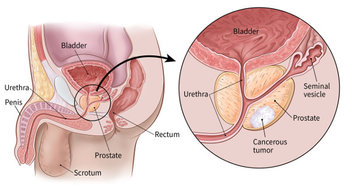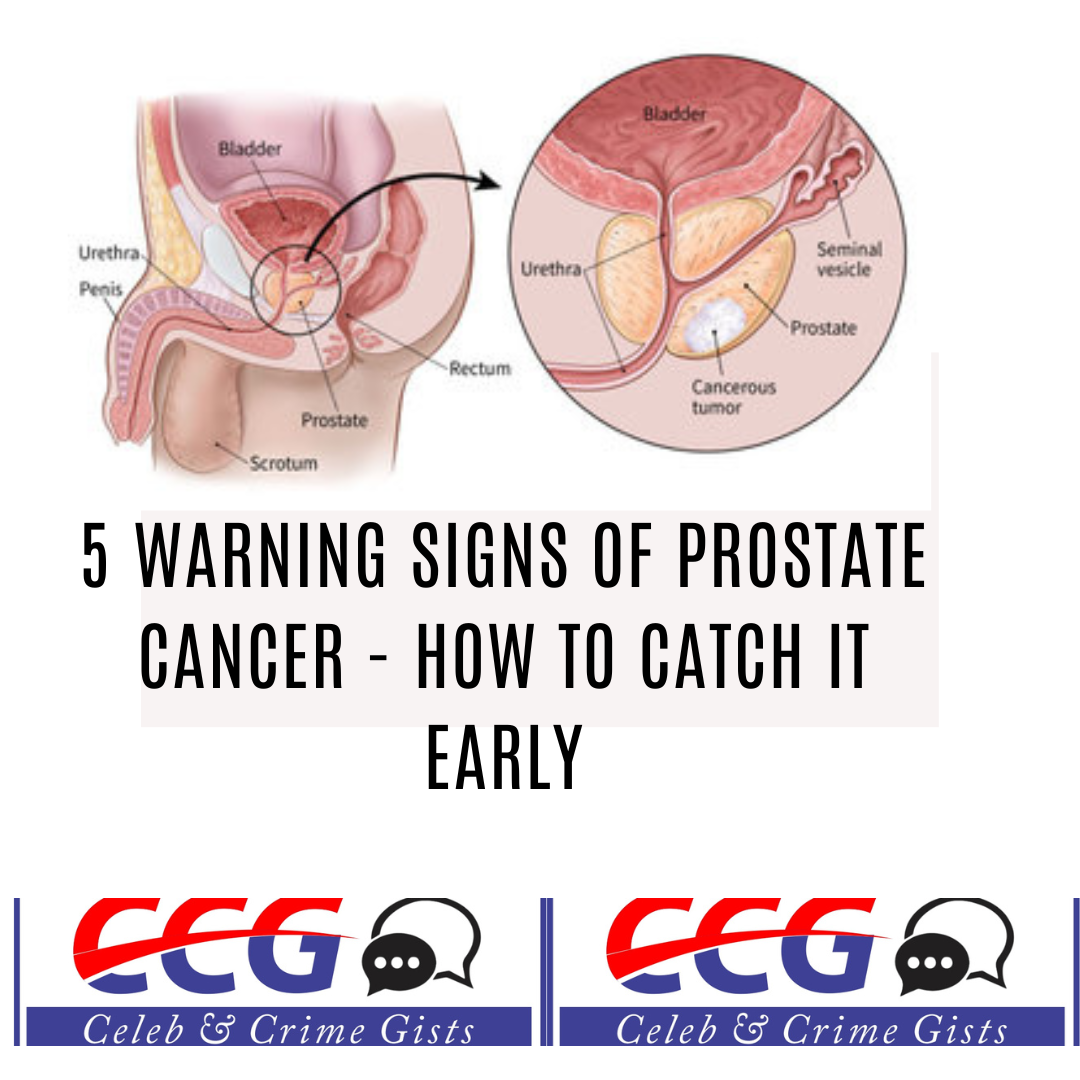5 Warning Signs Of Prostate Cancer – How To Catch It Early’ Prostate cancer is a serious but treatable condition, and the earlier it’s detected, the better your chances of successful treatment.
5 Warning Signs Of Prostate Cancer – How To Catch It Early
In this article, we’ll discuss the five warning signs of prostate cancer, so you can be more aware of the symptoms and take preventive measures if necessary. Read on to learn more about how to catch prostate cancer early!

Prostate cancer is the most common cancer in men, and while it is often slow-growing cancer, it can be aggressive and dangerous. The best way to catch prostate cancer early is to be aware of the warning signs and to get regular screenings.
Some of the warning signs of prostate cancer include a change in urinary habits, such as difficulty urinating or a need to urinate more frequently; pain or burning during urination; blood in the urine; erectile dysfunction; and pain in the lower back, hips, or thighs. If you experience any of these symptoms, it’s important to see your doctor right away for further testing.
Prostate cancer is most commonly diagnosed through a digital rectal exam (DRE) and/or a prostate-specific antigen (PSA) test. If your doctor suspects prostate cancer based on your DRE or PSA results, they may recommend a biopsy to confirm the diagnosis.
If you are over the age of 50 or have a family history of prostate cancer, it’s important to talk to your doctor about getting regular screenings. Screenings can help catch prostate cancer early when it’s most treatable.
READ POST: Is There Any Side Effect To Eating Guava During Pregnancy?
What is Prostate Cancer?
1. What is Prostate Cancer?
Prostate cancer is a type of cancer that affects the prostate, a small gland in the male reproductive system. The prostate is located just below the bladder and in front of the rectum. It produces semen, which transports sperm during ejaculation.
Prostate cancer usually develops slowly, and most men with this disease will never have any symptoms. However, some men may experience urinary problems, such as difficulty urinating or a decrease in the force of their urine stream. In rare cases, prostate cancer can spread to other parts of the body and cause more serious symptoms, such as pain in the bones or joints, weight loss, and fatigue.
If you are concerned about your risk for prostate cancer, talk to your doctor about ways to reduce your risk or screen for the disease.
5 Warning Signs of Prostate Cancer
1. A change in urination habits: If you suddenly find yourself needing to go more frequently, or having difficulty starting or stopping your stream, it could be a sign of prostate cancer.
2. Blood in the urine: While this could also be a sign of a less serious condition, like an infection, it’s worth getting checked out by a doctor just in case.
3. Painful urination: This is another symptom that could point to a number of different conditions, but if it’s accompanied by any of the other warning signs on this list, it’s worth mentioning to your doctor.
4. Erectile dysfunction: Not being able to get or maintain an erection can be an early warning sign of prostate cancer, as the disease can affect blood flow to the penis.
5. Frequent pain in the lower back, hips, or thighs: This is another symptom that could have a number of different causes, but if you’re experiencing it along with any of the others on this list, it’s worth getting checked out by a doctor.
– Difficulty Urinating
If you’re having difficulty urinating, it could be a sign of prostate cancer. The prostate is a small, walnut-sized gland that’s located between the bladder and the penis. It produces semen and helps to propel it during ejaculation.
When the prostate gland becomes enlarged, it can press against the urethra and block urine flow. This can cause urinary symptoms such as hesitancy (trouble starting), dribbling (a weak stream), urgency (a strong need to go), frequency (needing to go often), and wakefulness (having to urinate at night).
Prostate cancer usually grows slowly and initially causes no symptoms. That’s why it’s important to have regular checkups with your doctor, especially if you’re over 50 or have a family history of the disease. If you’re experiencing urinary problems, don’t delay in getting checked out by a doctor.
– Low Back Pain
1. Low back pain is one of the most common warning signs of prostate cancer. Many men experience some degree of low back pain, but if the pain is new or unusual, it could be a sign of prostate cancer. If you have any concerns about your back pain, be sure to talk to your doctor.
2. Another common warning sign of prostate cancer is difficulty urinating. If you find that you are having trouble starting or stopping your urine stream, or if you are experiencing a weak urine stream, you should see your doctor for an evaluation.
3. Blood in the urine or semen is another potential warning sign of prostate cancer. While this symptom is not always indicative of cancer, it is worth mentioning to your doctor so that they can rule out other potential causes.
4. Painful ejaculation is another possible warning sign of prostate cancer. If you experience pain during or after ejaculation, it is important to see your doctor for an evaluation.
5. Lastly, swollen lymph nodes can also be a sign of prostate cancer. Lymph nodes are often located in the groin area, so if you notice any swelling in this area, be sure to mention it to your doctor right away.
– Changes in Sexual Function
There are a number of warning signs that men should be aware of when it comes to prostate cancer. One of the most important is changes in sexual function. If you notice any changes in your ability to get or maintain an erection, or if you have any problems with ejaculation, it could be a sign of prostate cancer. Other sexual problems that can be caused by prostate cancer include pain during sex and difficulty achieving orgasm. If you experience any of these issues, it’s important to see a doctor so that they can rule out other potential causes and determine whether or not you have prostate cancer.
– Blood in Urine or Seminal Fluid
Prostate cancer is the most common cancer in men, and while it is most often slow-growing cancer that poses little threat, it can be aggressive and spread quickly. Early detection is key to successful treatment, so it is important to be aware of the warning signs.
Blood in urine or seminal fluid is one of the most common warning signs of prostate cancer. While this can be caused by other conditions, such as an infection, it is always worth getting checked out by a doctor if you notice blood in your urine or semen. Other symptoms of prostate cancer include difficulty urinating, a weak or interrupted urinary stream, and pain or burning during urination. If you experience any of these symptoms, please see a doctor for further testing.
– Abdominal Pain/Weight Loss
Prostate cancer is the most common cancer in men. It is important to be aware of the warning signs of prostate cancer so that you can catch it early and get treatment.
One of the most common warning signs of prostate cancer is abdominal pain or weight loss. If you experience either of these symptoms, it is important to see a doctor right away. Other warning signs include urinary problems, such as difficulty urinating or a change in the urinary stream. You may also experience sexual dysfunction, such as erectile dysfunction or reduced libido.
If you experience any of these symptoms, it is important to see a doctor right away for testing. Early detection is key to the successful treatment of prostate cancer.
How to Catch it Early: Screening and Diagnosis Tests for Prostate Cancer
There are several screening and diagnostic tests for prostate cancer, and the best way to catch it early is to have a combination of these tests performed regularly. The most common screening test is the prostate-specific antigen (PSA) blood test, which can detect elevated levels of PSA in the blood. Other tests include digital rectal exams (DREs), in which a doctor feels the prostate for any abnormalities, and transrectal ultrasound (TRUS), in which sound waves are used to create an image of the prostate. If any of these tests detect an abnormality, a biopsy may be recommended to confirm the diagnosis.
Taking Action: Treatment Options for Prostate Cancer
5 Warning Signs Of Prostate Cancer – How To Catch It Early- There are a number of treatment options available for prostate cancer, and the best option for you will depend on the stage and grade of your cancer, as well as your overall health. Some men may choose to active surveillance, which involves monitoring cancer closely with regular PSA tests and prostate biopsies, but not treating it immediately. This approach may be suitable for men with low-risk cancer who are not experiencing any symptoms. If cancer does progress, treatment options include surgery to remove the prostate (radical prostatectomy), radiation therapy, hormone therapy, and chemotherapy. Your doctor will help you determine the best course of action based on your individual situation.
READ MORE: 5 Healthy Foods You Should Keep In Your Fridge For Quicker Weight Loss


